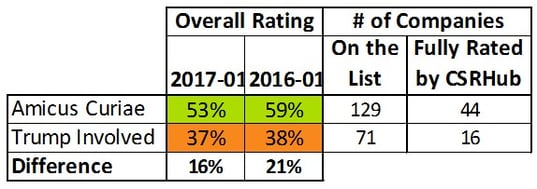Much has been written about America’s President, Donald Trump, and the effects his tenure will have on the world. We at CSRHub recently had an interesting opportunity to examine the relationship between President Trump’s businesses and corporate social responsibility (CSR).
A US group called “Grab Your Wallet” has launched a web site that looks for companies that are controlled by the Trump family or benefit from being associated with it. Their premise is that shoppers, investors, communities, employees and other stakeholders could signal their displeasure with Mr. Trump and his policies by boycotting companies associated with him. Of course, those who support Mr. Trump could use the same list as a guide to companies they should support. This dual perspective caused us to bring Grab Your Wallet in as a special issue that indicates whether or not a company is “Trump Involved.”
A different group of companies distinguished themselves recently by filing an amicus curiae motion in support of blocking Mr. Trump’s proposed ban on travel from certain predominantly Muslim countries. While participation in and support of legal efforts to block the Trump ban does not indicate that a company directly opposes all aspects of Mr. Trump’s policies, it does suggest a desire for distance from them.
Using CSRHub’s data, it is easy to compare and contrast the perceived sustainability performance of these two groups of companies. At a top overall ratings level (using our average user ratings weight profile), the CSRHub-rated companies within the amicus curiae group had an average rank among the 17,000+ companies we track of 56%. In contrast, the CSRHub-rated companies tagged by Grab Your Wallet as involved with Mr. Trump had an average rank 16% lower.

(Note that both lists contained many smaller companies that are not yet rated by CSRHub.)
The two groups seemed to be fairly similar in their treatment of environmental issues and reasonably close on governance matters. But, the Trump Involved companies were perceived to be dramatically lower on social issues—6% worse on community matters and 8% worse on employee-related topics.

CSRHub includes six subfactors within the social area. As you can see, the Trump Involved companies have especially weak scores relating to Community Development & Philanthropy, Compensation & Benefits, and Training Health & Safety.

Most of the Trump Involved businesses have a broad portfolio of products and services. Their financial exposure from a Grab Your Wallet boycott could be minimal. However, these business may want to examine more closely how they interact with their communities and their employees. They may not be hearing signals of dissatisfaction from these stakeholders that may be material to their overall business activities.
 Bahar Gidwani is CEO and Co-founder of CSRHub. He has built and run large technology-based businesses for many years. Bahar holds a CFA, worked on Wall Street with Kidder, Peabody, and with McKinsey & Co. Bahar has consulted to a number of major companies and currently serves on the board of several software and Web companies. He has an MBA from Harvard Business School and an undergraduate degree in physics and astronomy. He plays bridge, races sailboats, and is based in New York City.
Bahar Gidwani is CEO and Co-founder of CSRHub. He has built and run large technology-based businesses for many years. Bahar holds a CFA, worked on Wall Street with Kidder, Peabody, and with McKinsey & Co. Bahar has consulted to a number of major companies and currently serves on the board of several software and Web companies. He has an MBA from Harvard Business School and an undergraduate degree in physics and astronomy. He plays bridge, races sailboats, and is based in New York City.
CSRHub provides access to the world’s largest corporate social responsibility and sustainability ratings and information. It covers over 17,400 companies from 135 industries in 134 countries. By aggregating and normalizing the information from 530 data sources, CSRHub has created a broad, consistent rating system and a searchable database that links millions of rating elements back to their source. Managers, researchers and activists use CSRHub to benchmark company performance, learn how stakeholders evaluate company CSR practices, and seek ways to improve corporate sustainability performance.


.png)
